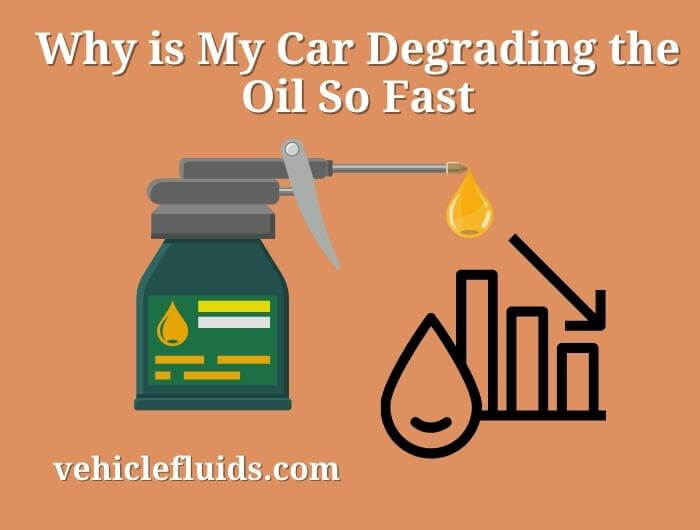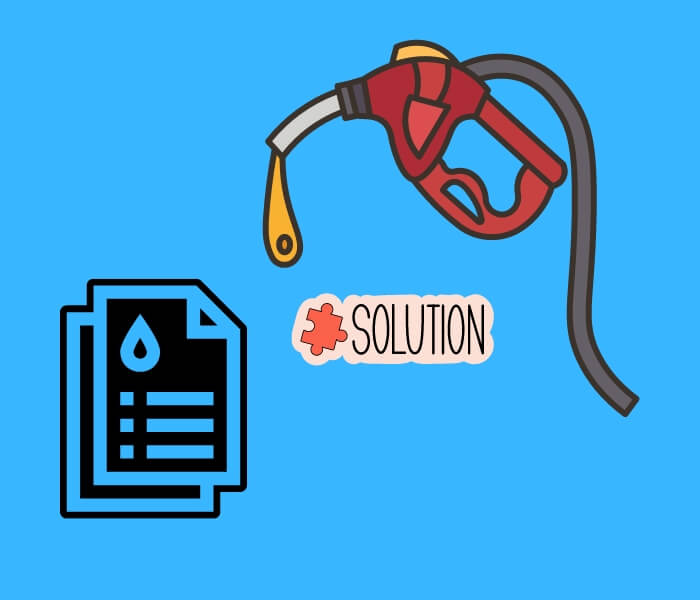Published on: February 13, 2023
Written by Gian Camilo / Fact-checked by Harun Khan
Discover the common causes of rapid oil degradation in your car. Learn how to diagnose and fix the problem. Read now for valuable insights.
Engine oil is essential for the proper functioning of your car’s engine. It acts as a lubricant, reducing friction between the engine’s moving parts and protecting them from wear and tear. However, engine oil can degrade over time, causing it to become less effective in protecting and lubricating the engine. In some cases, engine oil degradation can occur too quickly, leading to various issues with the car’s performance.

If you’re wondering why your car’s oil is degrading too fast, it’s important to understand the causes and effects of engine oil degradation and how to prevent it. This introduction will briefly overview engine oil degradation, why it occurs, and the steps you can take to protect your car’s engine.
What are the Common Causes of Fast Oil Degradation in a Car?
There are several common causes of fast oil degradation in a car, including:
1. Engine Oil Leaks
A leak in the engine can cause the oil level to drop, leading to increased exposure of the engine’s moving parts and faster oil degradation.
2. Overuse of the Engine
Extensive use of the engine can cause the oil to break down more quickly, reducing its effectiveness as a lubricant.
3. Excessive Oil Burn Off
Engine oil can also be burned off during normal operation, especially if the engine is running hot. This can cause the oil to break down more quickly.
4. Contamination by Other Substances
Dirt, debris, and other substances can enter the engine and mix with the oil, causing it to break down more quickly.
5. Poor-quality Oil
Poor-quality oil or oil not designed for your specific car can also lead to faster oil degradation.
6. Driving Habits
Aggressive driving habits, such as rapid acceleration and heavy braking, can cause increased stress on the engine and lead to faster oil degradation.
7. Engine Problems
Certain engine problems, such as worn-out or damaged components, can lead to faster oil degradation.
How to Diagnose Excessive Oil Consumption?
Diagnosing excessive oil consumption can be a complex process, but it is important to address the issue to prevent engine damage and improve your car’s performance. Here are some steps to diagnose excessive oil consumption:
1. Check the Oil Level Regularly
One of the easiest ways to diagnose excessive oil consumption is by regularly checking the oil level in the engine. If you notice that the oil level is consistently low, it could signify excessive oil consumption.
2. Keep Track of the Oil Consumption Rate
Keeping track of how much oil you add to the engine between oil changes can help you determine the oil consumption rate. If you are adding a significant amount of oil between changes, it could be a sign of excessive oil consumption.
3. Inspect the Engine for Leaks
Check the engine, oil pan, and oil filter for any signs of leaks. Leaks can cause the oil level to drop and lead to excessive oil consumption.
4. Check for Engine Problems
Certain engine problems, such as worn or damaged components, can lead to excessive oil consumption. If you suspect a problem with the engine, have it inspected by a professional mechanic.
5. Conduct a Compression Test
A compression test can help diagnose excessive oil consumption by measuring the pressure in the engine’s cylinders. If the compression is low, it could be a sign of excessive oil consumption.
6. Perform a Leak-down Test
A leak-down test can also help diagnose excessive oil consumption by measuring the engine’s pressure loss. If there is significant pressure loss, it could be a sign of excessive oil consumption.
7. Check the PCV (Positive Crankcase Ventilation) System
The PCV system is responsible for removing fumes from the crankcase and can cause excessive oil consumption if it is not functioning properly.
By following these steps, you can diagnose the cause of excessive oil consumption in your car and take the necessary steps to address the issue.
Solutions for Excessive Oil Consumption
Excessive oil consumption can be frustrating and potentially costly, but several solutions exist to help reduce or eliminate it. Here are some solutions for excessive oil consumption:

| Repair engine leaks: | If you have identified an engine leak as the cause of excessive oil consumption, have it repaired as soon as possible. It will help restore the proper oil level in the engine and reduce excessive oil consumption. |
| Replace worn or damaged engine components: | If you have identified them as the cause of excessive oil consumption, have them replaced by a professional mechanic. It also will help restore the engine’s proper functioning and reduce excessive oil consumption. |
| Check and replace the PCV system: | If you have identified a problem with the PCV system, have it checked and replaced if necessary. This will help ensure that fumes are properly removed from the crankcase and reduce excessive oil consumption. |
| Use high-quality oil: | High-quality oil designed for your car can help reduce excessive oil consumption. |
| Monitor driving habits: | Monitoring and reducing aggressive driving, such as rapid acceleration and heavy braking, can help reduce excessive oil consumption. |
| Regular maintenance: | Regular maintenance, including regular oil changes, can help reduce excessive oil consumption. |
If you still have trouble with excessive oil consumption, consider consulting a professional mechanic for further assistance.
Common Questions & Response
1. How Do I Know if My Car is Degrading the Oil Too Quickly?
Here are some signs that your car may be degrading the oil too quickly:
Low Oil Level
If you frequently have to add oil to your car between oil changes, it could signal that the engine consumes oil too quickly.
Blue Smoke From the Exhaust:
If you notice blue smoke coming from the exhaust, it could indicate that oil is being burned off in the engine.
Engine Noise
If you hear increased engine noise, it could be a sign that the engine is not receiving enough oil and is running dry.
Poor Engine Performance
If you notice decreased engine performance, such as a lack of power or acceleration, it could indicate increased oil consumption.
Engine Oil Light
If the engine oil light comes on, it could indicate that the oil level is low and the engine consumes oil too quickly.
If you suspect your car is degrading the oil too quickly, it is important to have it inspected by a professional mechanic as soon as possible. They can perform a diagnostic test to determine the specific cause of the issue and recommend the best course of action to address it.
2. What Are the Effects of Engine Oil Degradation on My Car?
Engine oil degradation can have several negative effects on your car, including:
- If the engine is not receiving enough oil, it can cause increased wear and tear on the engine components, potentially leading to engine damage.
- If the engine is consuming oil too quickly, it can result in decreased fuel efficiency and increased fuel costs.
- Engine oil helps lubricate the moving parts in the engine, and a lack of oil can lead to decreased engine performance, including a lack of power and acceleration.
- If the engine is burning off oil, it can increase emissions and harm the environment.
- Increased oil consumption can result in more frequent oil changes and other maintenance costs.
It is important to address engine oil degradation as soon as possible to minimize its negative effects on your car. Consulting a professional mechanic can help determine the specific cause of the issue and recommend the best course of action to address it.
3. Can I Use a Different Type of Oil Prevent Engine Oil Degradation?
Using a different type of oil may help prevent engine oil degradation in some cases, but it depends on the specific cause of the issue. Some factors that can contribute to engine oil degradation include:
Engine Wear
Over time, normal engine wear can result in increased oil consumption. In this case, using a different type of oil may not help prevent the issue.
Poor Engine Design
Some engines may be designed in such a way that they consume oil more quickly than others. In this case, using a different type of oil may not help prevent the issue.
Poor Oil Quality
If the oil being used is of poor quality, it may break down more quickly and result in increased oil consumption. In this case, switching to a higher-quality oil may help prevent the issue.
Incorrect Oil Viscosity
If the oil being used has the incorrect viscosity for the engine, it may break down more quickly and increase oil consumption. In this case, switching to the correct viscosity oil may prevent the issue.
It is important to consult a professional mechanic to determine your car’s specific cause of engine oil degradation and recommend the best course of action, including which type of oil to use. They can also help ensure that the oil change is performed correctly to maximize the benefits of using a different type of oil.
4. What Should I Do First if I Suspect My Car’s Oil is Degrading Too Quickly?
If you suspect your car’s oil is degrading too quickly, the first step is to check the oil level regularly and monitor for any sudden drops. If you notice a significant decrease in oil level, it is important to take action promptly to prevent damage to the engine. Here are some steps you can take:
1. Consult a Professional Mechanic
A professional mechanic can thoroughly inspect your car’s engine and identify the cause of the excessive oil consumption.
2. Check for Oil Leaks
A visual inspection of your car’s engine and undercarriage can help identify any oil leaks contributing to the issue.
3. Monitor Engine Performance
Pay close attention to your car’s engine performance, including any unusual noises, decreased power, or increased emissions. These can be signs of engine problems related to excessive oil consumption.
4. Change the Oil and Filter
If you have yet to do so recently, consider changing the oil and filter to see if that improves the oil consumption rate.
5. Keep Accurate Records
Keep detailed records of your car’s oil consumption, including the date and mileage each time you add oil so that you can track the issue over time.
It is important to address the issue of excessive oil consumption as soon as possible to prevent potential damage to your car’s engine. These steps can help you get to the root of the problem and find the best solution.
Summary
A car’s engine oil plays a crucial role in maintaining the health of the engine and preventing damage. When the oil degrades too quickly, it can lead to various problems and potentially cause costly repairs. Understanding the common causes of fast oil degradation and taking the appropriate steps to diagnose and prevent the issue is essential for maintaining the longevity of your car’s engine.
Regular oil changes, monitoring engine performance, and consulting a professional mechanic when necessary can help keep your car’s engine in good condition and prevent excessive oil consumption.
